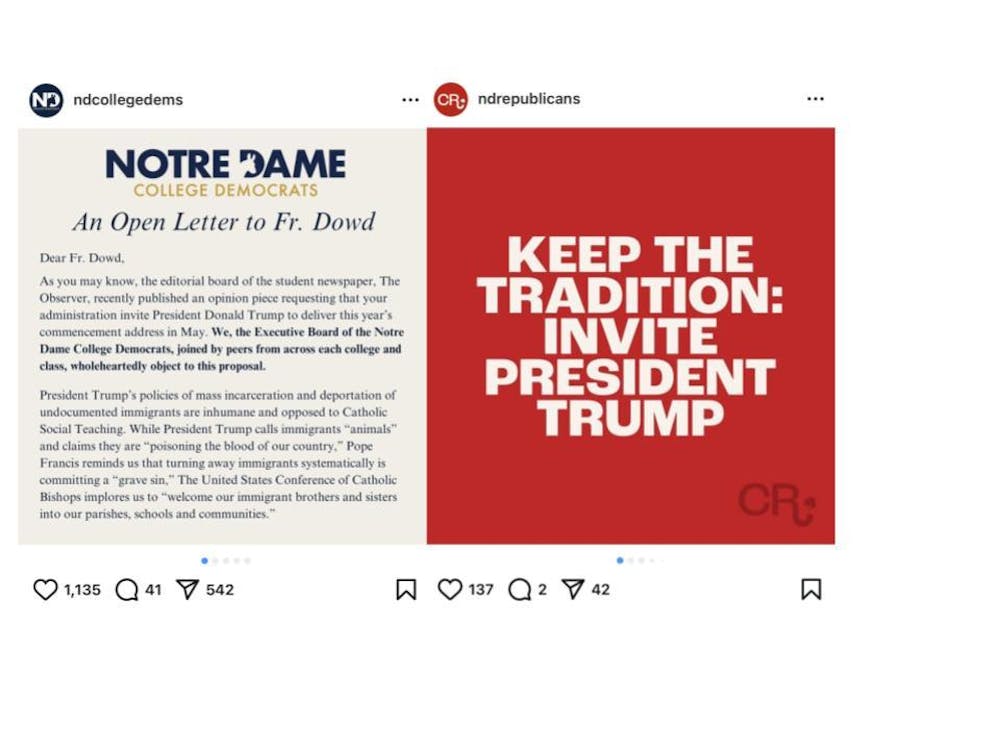The Notre Dame College Democrats Executive Board posted a letter last Wednesday requesting University President Fr. Robert Dowd refrain from inviting President Trump to speak at commencement this year. The letter served as a response to The Observer’s recent editorial, which called for Trump’s invitation. Yesterday, the Notre Dame College Republicans Board posted a response to the College Democrats statement, titled “Keep the Tradition.”
Presidents who have spoken at Notre Dame commencement include Dwight Eisenhower, Jimmy Carter, Ronald Reagan, George H. W. Bush, George W. Bush and Barack Obama.
The College Democrats’ letter argued that Trump’s policies stand in opposition to Catholic Social Teaching (CST) and therefore Notre Dame’s values, contrasting mass incarceration and immigration policies with statements from Pope Francis and the United States Conference of Catholic Bishops.
In their letter supporting Trump’s prospective invitation, the College Republicans addressed this connection between CST and immigration policies, writing, “prudential border control is not uncatholic,” and making the case that Catholic teachings enable the creation and legislative control of borders.
In a 2024 interview with Notre Dame Magazine, former University President Fr. John Jenkins shared that former Vice President Mike Pence was invited instead of Trump in 2017 due to Trump’s failure to meet “a certain bar in terms of just moral decency.”
College Democrats further argued that Trump’s foreign aid policies stand in violation of CST, writing, “by freezing foreign aid, dismantling the United States Agency for International Development (USAID), and threatening to annex Greenland, the Panama Canal and the Gaza Strip, the Trump administration is allowing millions to fall into poverty, famine, disease and uncertainty while suggesting Americans can blindly ignore this harm.” They went on to suggest that these actions stand against the University’s mission of “bettering the world around us” and being a force for good.
In response, the College Republicans wrote that, “just as a father would be wrong to deprive his children of food by donating it to a faraway land, prioritizing non-citizens at the expense of citizens is gravely unjust,” arguing that an embrace of foreign aid represented an “incredibly misguided reading of CST.” They argued that CST’s principle of subsidiarity meant citizens should be prioritized and decisions should favor the community.
The College Republicans also suggested that conforming to CST has not traditionally been a requirement for invitation, as President Biden was invited (but did not attend) in 2021 despite his advocacy for the preservation of abortion access and President Obama spoke in 2009 despite his support for abortion access and his enacting of deportation policies.
“As a baptized Catholic, former President Biden was not only in a canonical state to receive excommunication but also publicly scandalized Catholics and the Catholic faith through his advocacy for abortion — far more than can be said about President Trump,” the College Republicans wrote.
The College Republicans continued by maintaining that if adherence to CST was a necessity for acceptance at Notre Dame, the College Democrats themselves stand in clear opposition to CST and would therefore be banned, writing that the Democrats “promote abortion, the transitioning of minors and access to euthanasia.”
The College Democrats argued that their objection was not simply partisan. Rather, they stood in opposition to The Observer’s assertion that “inviting the President to speak would highlight a commitment to civil dialogue.”
“While we agree that Notre Dame students must be able to engage in respectful and productive conversation, President Trump is one of the last people students should try to emulate in this regard,” the College Democrats wrote.
The Democrats cited the Notre Dame Democracy Initiative’s efforts to make campus a place for productive dialogue around preserving democracy. “[Trump’s] refusal to accept the legitimate election results and the peaceful transfer of power, a centuries-old democratic tradition of our nation, shakes the very foundation of democracy in the United States,” wrote the College Democrats.
The College Republicans called the University’s democracy initiatives “absurd” and maintained that claims of a threat to democracy posed by Trump were invalid as he “defeated his opposition in a free and fair election.”
The College Republicans suggested that the invitation of Pence rather than Trump in 2016 was the product of “a tidal wave of liberal panic overwhelming our institutions.”
They argued that this time around, the invitation would “positively affect public discourse,” maintaining that because the majority of Catholic voters supported Trump, “now is the moment to recenter the conversation on our shared faith and encourage cross-party Catholic political solidarity at Notre Dame.”
The College Democrats ended their statement by acknowledging that Notre Dame does have a long tradition of inviting presidents and vice presidents to speak, but wrote that “restarting this tradition with a president or vice president who espouses anti-immigrant rhetoric, denies election results and pardons violent insurrectionists, has been found liable for sexual abuse, and attacks the human dignity of our brothers and sisters across the world would be counter to the ideals of Our Lady’s University.”
The College Republicans said refusing to invite Trump “would be deeply regrettable if a school so invested in democratic outcomes and American Catholic identity were to refuse to invite the sitting president to speak.”










